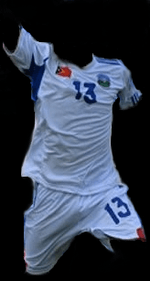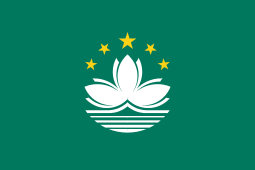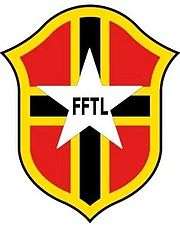The Timor-Leste national football team is the national team of East Timor (Timor-Leste) and is controlled by the Federação de Futebol de Timor-Leste. East Timor joined FIFA on 12 September 2005.
Timor-Leste's international debut was in the preliminary round of the AFC Asian Cup in March 2003, when they lost 3–2 to Sri Lanka and 3–0 to Chinese Taipei. They also participated in the 2004 Tiger Cup. Timor-Leste's participation in South East Asia's premier international football event in 2004 was announced after an Asian Football Confederation council meeting in Petaling Jaya. Although not yet a member of the AFC, the Timor-Leste Football Association was invited to sit in on the meeting, where they were represented by FA president Francisco Kalbuadi. Timor-Leste won their first international match on 5 October 2012 against Cambodia with a score of 5–1.[3]
History
Football was established in Timor-Leste during the Portuguese colonial era, when many of the locals and the Portuguese officials played amateur football. After Portugal ended its colonial rule, Indonesia invaded and occupied the island. East Timor eventually gained independence from Indonesia in 2000, which resulted in a long running battle against Jakarta-led forces.
The East Timor Football Association was accepted as an associate member of AFC at the 20th AFC Congress in 2002. Their international debut came in March 2003 when they participated in the qualifying campaign for the 2004 AFC Asian Cup in China. Given their history, it was no surprise that they crashed out with defeats against the likes of Sri Lanka and Chinese Taipei. They entered the regional competition for the first time in 2004 as they played in the ASEAN Football Federation Championship (previously known as Tiger Cup) as an invited member. They finished in last place, showing that they had a long way to go before they could compete even on the regional stage.
They again had no success in the qualifying round of the 2007 ASEAN Football Federation Championship, with four heavy losses, including a 7–0 trouncing by the Philippines. In the third qualifying round for the 2008 AFF Suzuki Cup, they surprisingly drew against Cambodia; this feat was reported in international news.
In the ninth AFF Suzuki Cup, the country's football federation (FFTL) will reportedly select their foreign based players, who play in Brazil, Portugal, Australia and elsewhere, to fortify the team as they also did at the 2011 SEA Games.[4]
On 5 October 2012, Timor-Leste win their first international match against Cambodia which they score 5–1. The score lead by national Adelino Trindade (twice) and Brazilians Murilo de Almeida (twice) and Alan Leandro (penalty kick).[5] On 9 October 2012 The rising sun team won another match against the Indochina team, Laos at AFF Suzuki Cup qualifier. Murilo de Almeida score the penalty at 43 minutes of the first half of the match. Later Adelino Trinidade extended the Timorese advantage with a header early in the second half and then Alan Leandro added the third goal in 83 minutes.[6] After winning the second match against Laos, Emerson Alcântara stated "This is a win for the people of Timor Leste," said the Brazilian. "They had to wait a long time for our team to win their first match in this competition but now we have two wins and this was an important victory for Timor Leste. "I think that about 70 percent of people in Timor Leste are poor so it is very important to get this result for them because they love football and the people can get confidence and take pride in this result. It is very important for us to motivate our people and to help to change their lives.[7]
In 2018 FIFA World Cup qualification of Asian zone, Timor-Leste wrote history for the first country to win 4–1 over Mongolia.
Naturalised players controversy
Since 2012 several Brazilian-born footballers, who are not of East Timorese descent and had not necessarily played in the East Timorese League, were expressly naturalised to raise the level of "Sol Nascente".
The country's recent history of naturalizing foreign players, mainly from Brazil such as Murilo de Almeida, Fellipe Bertoldo, and Diogo Santos Rangel has been criticized by many, including native East Timorese players and fans.[8][9]
In a match on 8 October 2015 against Palestine seven of the starting eleven for the Timorese line-up were naturalized Brazilians.[10] Following the match the Palestinian Football Association made a complaint to FIFA stating that the naturalized Timorese players were not eligible to represent Timor-Lester under FIFA rules.[11]
Following a concern from some Timorese who complained to the prime minister, the prosecutor general and the minister for justice regarding the naturalisation program, Timor Leste Football Federation (FFTL) decided to drop their oversea-born legion. It meant Timor Leste would be without seven naturalised Brazilian players for the 2018 FIFA World Cup and 2019 AFC Asian Cup joint qualifiers match against United Arab Emirates on 12 November 2015.[12] In that match coach Fernando Alcântara played an all national line up including six who were under twenty, including Ervino Soares who was 16. Timor Leste ended up losing the match 8–0. Alcântara took responsibility for the defeat although he also added that he had been forced to play such an inexperienced line-up by the FFTL.[13]
Jesse Pinto, an Australian-Timorese footballer, told reporters that the FFTL gives Brazilian players Timorese passports so that they can be registered as "Asian" players and meet the quotas of teams. Pinto also added that the FFTL often takes advantage of players from poor backgrounds, but that it often did not meet its promises of allowing players to travel back to Brazil to meet their families.[14]
Kits

Adidas Timor Leste released away jersey on 2010 AFF Suzuki Cup
Since 2015, the kits have been made by mitre. The home kit is traditional colours (red shirts, black shorts and black striped red socks) and the away kit is all whites. From 2008 to 2010, their away kits were yellow but at 2010 AFF Suzuki Cup qualification, the away kits changed back into all whites. Previous kit makers include Joma, Nike and Tiger.
Strip evolution
| (2004) |
| Home |
Away |
|
|
| No supplier |
|
| (2007) |
| Home |
Away |
|
|
| No supplier |
|
|
| (2010–2011) |
| Home |
Away |
|
|
| Nike |
|
| (2012) |
| Home |
Away |
Alternative |
|
|
|
|
Competition records
World Cup record
- As of match played 17 November 2015
| World Cup Finals |
|
World Cup Qualifications |
| Year |
Result |
Position |
GP |
W |
D* |
L |
GS |
GA |
GP |
W |
D* |
L |
GS |
GA |
 2006 2006 | Did not enter | - | - | - | - | - | - | - |
|
 2010 2010 | Did not qualify | - | - | - | - | - | - | - |
2 | 0 | 0 | 2 | 3 | 11 |
 2014 2014 | Did not qualify | - | - | - | - | - | - | - |
2 | 0 | 0 | 2 | 1 | 7 |
 2018 2018 | Did not qualify | - | - | - | - | - | - | - |
9 | 2 | 2 | 5 | 7 | 30 |
| Total | - | - | - | - | - | - | - | - |
13 | 2 | 2 | 9 | 11 | 48 |
Lusofonia Games
| Jogos da Lusofonia |
|---|
| Year |
Round |
GP |
W |
D |
L |
GS |
GA |
 2006 2006 | Group Stage | 0 | 0 | 0 | 2 | 0 | 10 |
 2009 2009 | Did not Enter | - | - | - | - | - | - |
 2014 2014 | Did not Enter | - | - | - | - | - | - |
| Total | Group Stage | 0 | 0 | 0 | 2 | 0 | 10 |
|
|
|
|
Asian Cup record
AFC Challenge Cup record
- 2006 – Was originally selected to take part, but was then replaced
- 2008 – Was selected to take part, but withdrew
AFC Solidarity Cup record
ASEAN Competitions History
This competition was formerly known as the Tiger Cup


